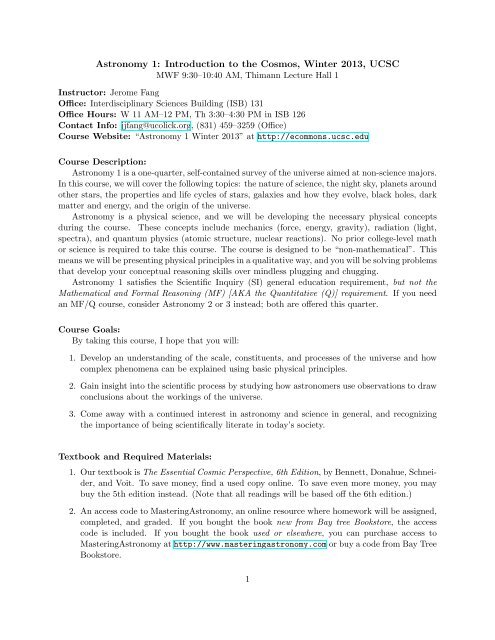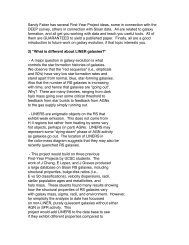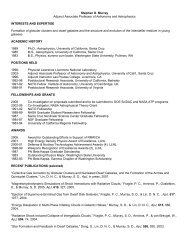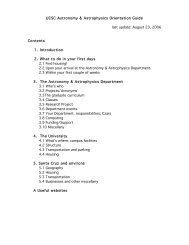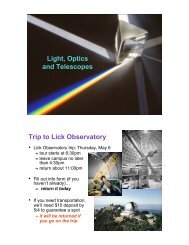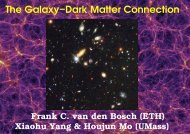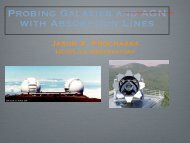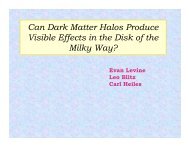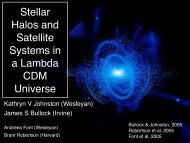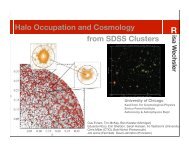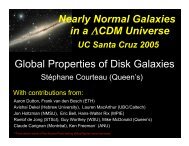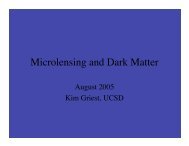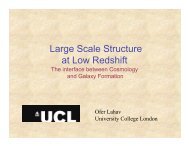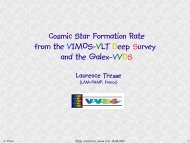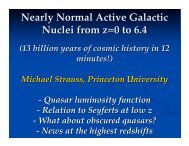Astronomy 1: Introduction to the Cosmos, Winter 2013, UCSC
Astronomy 1: Introduction to the Cosmos, Winter 2013, UCSC
Astronomy 1: Introduction to the Cosmos, Winter 2013, UCSC
Create successful ePaper yourself
Turn your PDF publications into a flip-book with our unique Google optimized e-Paper software.
<strong>Astronomy</strong> 1: <strong>Introduction</strong> <strong>to</strong> <strong>the</strong> <strong>Cosmos</strong>, <strong>Winter</strong> <strong>2013</strong>, <strong>UCSC</strong><br />
MWF 9:30–10:40 AM, Thimann Lecture Hall 1<br />
Instruc<strong>to</strong>r: Jerome Fang<br />
Office: Interdisciplinary Sciences Building (ISB) 131<br />
Office Hours: W 11 AM–12 PM, Th 3:30–4:30 PM in ISB 126<br />
Contact Info: jjfang@ucolick.org, (831) 459–3259 (Office)<br />
Course Website: “<strong>Astronomy</strong> 1 <strong>Winter</strong> <strong>2013</strong>” at http://ecommons.ucsc.edu<br />
Course Description:<br />
<strong>Astronomy</strong> 1 is a one-quarter, self-contained survey of <strong>the</strong> universe aimed at non-science majors.<br />
In this course, we will cover <strong>the</strong> following <strong>to</strong>pics: <strong>the</strong> nature of science, <strong>the</strong> night sky, planets around<br />
o<strong>the</strong>r stars, <strong>the</strong> properties and life cycles of stars, galaxies and how <strong>the</strong>y evolve, black holes, dark<br />
matter and energy, and <strong>the</strong> origin of <strong>the</strong> universe.<br />
<strong>Astronomy</strong> is a physical science, and we will be developing <strong>the</strong> necessary physical concepts<br />
during <strong>the</strong> course. These concepts include mechanics (force, energy, gravity), radiation (light,<br />
spectra), and quantum physics (a<strong>to</strong>mic structure, nuclear reactions). No prior college-level math<br />
or science is required <strong>to</strong> take this course. The course is designed <strong>to</strong> be “non-ma<strong>the</strong>matical”. This<br />
means we will be presenting physical principles in a qualitative way, and you will be solving problems<br />
that develop your conceptual reasoning skills over mindless plugging and chugging.<br />
<strong>Astronomy</strong> 1 satisfies <strong>the</strong> Scientific Inquiry (SI) general education requirement, but not <strong>the</strong><br />
Ma<strong>the</strong>matical and Formal Reasoning (MF) [AKA <strong>the</strong> Quantitative (Q)] requirement. If you need<br />
an MF/Q course, consider <strong>Astronomy</strong> 2 or 3 instead; both are offered this quarter.<br />
Course Goals:<br />
By taking this course, I hope that you will:<br />
1. Develop an understanding of <strong>the</strong> scale, constituents, and processes of <strong>the</strong> universe and how<br />
complex phenomena can be explained using basic physical principles.<br />
2. Gain insight in<strong>to</strong> <strong>the</strong> scientific process by studying how astronomers use observations <strong>to</strong> draw<br />
conclusions about <strong>the</strong> workings of <strong>the</strong> universe.<br />
3. Come away with a continued interest in astronomy and science in general, and recognizing<br />
<strong>the</strong> importance of being scientifically literate in <strong>to</strong>day’s society.<br />
Textbook and Required Materials:<br />
1. Our textbook is The Essential Cosmic Perspective, 6th Edition, by Bennett, Donahue, Schneider,<br />
and Voit. To save money, find a used copy online. To save even more money, you may<br />
buy <strong>the</strong> 5th edition instead. (Note that all readings will be based off <strong>the</strong> 6th edition.)<br />
2. An access code <strong>to</strong> Mastering<strong>Astronomy</strong>, an online resource where homework will be assigned,<br />
completed, and graded. If you bought <strong>the</strong> book new from Bay tree Books<strong>to</strong>re, <strong>the</strong> access<br />
code is included. If you bought <strong>the</strong> book used or elsewhere, you can purchase access <strong>to</strong><br />
Mastering<strong>Astronomy</strong> at http://www.masteringastronomy.com or buy a code from Bay Tree<br />
Books<strong>to</strong>re.<br />
1
3. ABCD Voting Card—This will be handed out on <strong>the</strong> first day. You will be using it <strong>to</strong> vote<br />
during think-pair-share questions. BRING IT TO EACH CLASS! If you lose yours, you<br />
must download <strong>the</strong> PDF file from our eCommons website (look under “Resources”) and print<br />
ano<strong>the</strong>r card.<br />
4. On test days, you need <strong>to</strong> provide your own Scantron form #F-1712 and a #2 pencil.<br />
Course Websites:<br />
The main class website is hosted on eCommons at http://ecommons.ucsc.edu. The course<br />
name is “<strong>Astronomy</strong> 1 <strong>Winter</strong> <strong>2013</strong>,” which should be visible once you have enrolled in <strong>the</strong> class.<br />
Annnouncements, lecture notes, grades, and a discussion forum/chat room will be found here.<br />
You will be using <strong>the</strong> Mastering<strong>Astronomy</strong> (MA) website (http://masteringastronomy.com)<br />
<strong>to</strong> complete homework assignments. The site also provides excellent tu<strong>to</strong>rials and assessments <strong>to</strong><br />
help you study <strong>the</strong> material. Our MA course ID is AY1FANG<strong>2013</strong>.<br />
IMPORTANT: When you enroll on MA, be sure <strong>to</strong> select <strong>the</strong> correct textbook<br />
edition: The Essential Cosmic Perspective, SIXTH Edition, even if you bought an<br />
older edition.<br />
Course Assessment:<br />
1. In-class writing assignments will be completed during each lecture. These assignments<br />
will be graded on effort (not if you answer correctly) using a 3-point scale (2 points = complete<br />
and clear response; 1 point = incomplete/unclear response; 0 points = no response). No late<br />
writing assignments will be accepted. Instead, <strong>the</strong> lowest three scores will be dropped when<br />
computing your final grade.<br />
2. Homework is assigned regularly and forms a significant portion of your final grade. Each<br />
assignment consists of multiple choice and short answer questions, as well as interactive<br />
tu<strong>to</strong>rials. Homework is completed and submitted online through MA. Due dates are listed in<br />
<strong>the</strong> schedule below. Scores for late assignments will be reduced by 20% for each day late.<br />
3. Exams consist of two in-class midterms and one final. The midterms will emphasize <strong>the</strong><br />
most recent material, but will also include a few questions on older material. The final<br />
exam is cumulative. All exams are multiple choice and are closed-book and closed-notes. No<br />
calcula<strong>to</strong>r is needed for exams. BRING YOUR STUDENT ID–it will be checked! Exam<br />
dates are listed in <strong>the</strong> schedule below. There are NO make-up exams, except in exceptional<br />
circumstances (you must make arrangements with me in advance). You must take each<br />
exam in order <strong>to</strong> pass <strong>the</strong> class.<br />
Think-Pair-Share Questions:<br />
Lectures will be interspersed with think-pair-share (TPS) questions that assess your comprehension<br />
of <strong>the</strong> material discussed that day. TPS questions are multiple-choice questions that work<br />
as follows: 1) All students initially vote on <strong>the</strong> answer <strong>the</strong>y think is correct, 2) students share <strong>the</strong>ir<br />
reasoning with a partner and try <strong>to</strong> convince <strong>the</strong> o<strong>the</strong>r <strong>the</strong>y are correct, and 3) <strong>the</strong> whole class<br />
votes again. This technique has been shown <strong>to</strong> increase student engagement and comprehension,<br />
and is a great way <strong>to</strong> practice expressing your ideas in a low-pressure environment. While your<br />
responses are not graded, several exam questions will be based on <strong>the</strong> TPS questions.<br />
2
Grading:<br />
In-class Writing (drop lowest 3 scores) = 15%<br />
Homework = 25%<br />
Two Midterm Exams = 30% (15% each)<br />
Final Exam = 30%<br />
There is NO extra credit in this course. Final grades will be “curved” such that <strong>the</strong> class average<br />
is roughly a B–. If you are taking <strong>the</strong> class Pass/No Pass, you must earn a C or higher in order <strong>to</strong><br />
receive a Pass.<br />
Getting Help:<br />
Unfortunately, this course has no teaching assistants or discussion sections. However, <strong>the</strong>re are<br />
still many ways for you <strong>to</strong> get help with <strong>the</strong> material.<br />
1. Office hours: Please s<strong>to</strong>p by during my OH (or set up an appointment) whenever you want<br />
<strong>to</strong> discuss course content, get help on assignments, or just <strong>to</strong> chat. OH are a great way for<br />
me <strong>to</strong> get <strong>to</strong> know students better and provide help one-on-one.<br />
2. eCommons Discussion Forum & Chat Room: Our class website on eCommons has a<br />
discussion forum where you can post questions related <strong>to</strong> <strong>the</strong> course. Students are encouraged<br />
<strong>to</strong> help each o<strong>the</strong>r out by posting replies. I will also post replies when needed. Also, <strong>the</strong>re is<br />
a real-time chat room where you can talk with o<strong>the</strong>r students who are signed in.<br />
3. Tu<strong>to</strong>ring: <strong>UCSC</strong> Learning Support Services (http://www2.ucsc.edu/lss/) offers tu<strong>to</strong>ring<br />
for <strong>Astronomy</strong> 1. Students can sign up for weekly, one-hour sessions with a tu<strong>to</strong>r. This<br />
service is free and open <strong>to</strong> all students. See <strong>the</strong> LSS website for more information.<br />
Academic Dishonesty:<br />
All work done in this course must be your own. Cheating and plagiarism will not be <strong>to</strong>lerated<br />
in this class. If you are caught cheating on an assignment or exam, you (and anyone else involved)<br />
will receive a zero for that assignment or exam. In addition, you will be reported <strong>to</strong> <strong>the</strong> university<br />
for disciplinary action. Please familiarize yourself with <strong>the</strong> following guide <strong>to</strong> academic integrity:<br />
http://undergraduate.ucsc.edu/acd_integrity/student.html.<br />
Disability Accomodations:<br />
If you qualify for classroom accommodations because of a disability, please submit your Accommodation<br />
Authorization from <strong>the</strong> Disability Resource Center (DRC) <strong>to</strong> me during my office hours<br />
in a timely manner, preferably within <strong>the</strong> first two weeks of <strong>the</strong> quarter. Questions? Contact <strong>the</strong><br />
DRC at 831-459-2089 or by email at drc@ucsc.edu.<br />
Course Schedule:<br />
The next page lists <strong>the</strong> course schedule. The table includes <strong>the</strong> <strong>to</strong>pic covered during each lecture,<br />
<strong>the</strong> relevant reading, and important dates. Please note that <strong>the</strong> schedule may change during <strong>the</strong><br />
quarter depending on our rate of progress. Any updates will be announced and <strong>the</strong> schedule revised.<br />
3
Lecture Schedule, Due Dates, Exam Dates<br />
Lecture Date Topic and Reading Due Dates<br />
1/7 Class Intro; Our Place in <strong>the</strong> Universe (Ch 1)<br />
1/9 Night Sky; Sun and Seasons (Ch 2.1, 2.2)<br />
1/11 Moon Phases and Eclipses (Ch 2.3) MA Intro DUE*<br />
1/14 Planetary Motion; Kepler’s laws (Ch 2.4, 3.3)<br />
1/16 Nature of Science (Ch 3.4)<br />
1/18 Motion; Forces; New<strong>to</strong>n’s Laws (Ch 4.1, 4.2) HW #1 DUE*<br />
1/21 No Class–MLK Holiday<br />
1/23 Energy; Gravity (Ch 4.3, 4.4)<br />
1/25 Light and Matter (Ch 5.1)<br />
1/28 Spectra; Doppler Effect (Ch 5.2)<br />
1/30 Catch-up; Review for Midterm<br />
2/1 MIDTERM HW #2 DUE<br />
2/4 Searching for Exoplanets (Ch 6.5)<br />
2/6 The Sun; Nuclear Fusion (Ch 10.1, 10.2)<br />
2/8 Properties of Stars (Ch 11.1) HW #3 DUE<br />
2/11 Patterns Among Stars (Ch 11.2)<br />
2/13 Star Birth (Ch 12.1)<br />
2/15 Life Cycle of Low-Mass Stars (Ch 12.2) HW #4 DUE<br />
2/18 No Class–President’s Day<br />
2/20 Life Cycle of High-Mass Stars (Ch 12.3)<br />
2/22 White Dwarfs & Neutron Stars (Ch 13.1, 13.2)<br />
2/25 Relativity & Black Holes (Ch 13.3)<br />
2/27 Catch-up; Review for Midterm<br />
3/1 MIDTERM HW #5 DUE<br />
3/4 Milky Way Galaxy (Ch 14.1, 14.2)<br />
3/6 Galaxies (Ch 15.1, 15.3)<br />
3/8 Supermassive Black Holes (Ch 14.4, Ch 15.4) HW #6 DUE<br />
3/11 Dark Matter (Ch 16.1, 16.2)<br />
3/13 The Big Bang (Ch 17.1, 17.2)<br />
3/15 Expanding Universe; Dark Energy (Ch 15.2, 16.4)<br />
3/18 Catch-up; Review for Final HW #7 DUE<br />
3/22 FINAL EXAM, Friday, 8–11 AM<br />
* = These due dates will be extended for students enrolling after <strong>the</strong> quarter has begun.<br />
4


